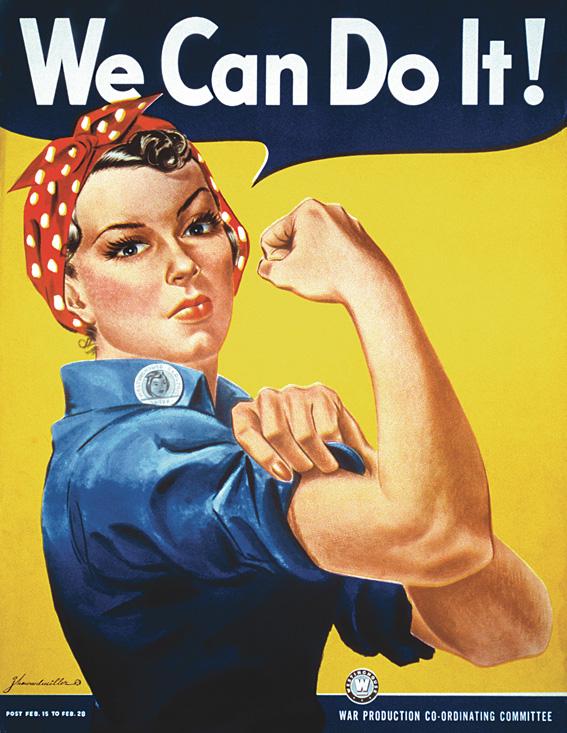Redefining feminism: concept shares positive, negative connotations
Photo courtesy of Wikimedia commons
People have this idea that the feminist movement was only about creating equal work place environments for women, but the feminist movement was also about creating choices.
November 8, 2015
Anyone can be a feminist, regardless if they know they are.
“I never knew I was a feminist,” said Amber Klootwyk, senior in graphic design.
Klootwyk grew up on a farm in central Iowa. When she was younger, her father suffered from a back injury, which kept him from being able to work on their family farm. She took over her father’s responsibilities and essentially took on a traditionally male role. Klootwyk grew up as an individual without gender limitations.
It wasn’t until Klootwyk came to Iowa State when she realized she wasn’t like most other girls on campus.
“I wasn’t going to conform to the ‘go to college to find a husband and then become a stay-at-home mom’ lifestyle that was expected of me,” Klootwyk said. “There’s nothing wrong with that route, it’s just that people shouldn’t be categorized like that. Everyone should have the opportunity to map out their own lives.”
There’s a common denominator between Klootwyk’s logic and feminism: both point toward unconditional equality of the human race, no matter a person’s gender.
According to the Merriam-Webster dictionary, the definition of feminism is “The belief that men and women should have equal rights and opportunities.”
The goal of feminism is instead of having one sex greater or lesser than the other, have the sexes on an equal playing field in all aspects of life.
“Feminism is the social, political and economic equality of the sexes,” Klootwyk said.
This simple concept has been construed into something much hairier.
Feminism began taking a foothold in the late 18th century. The world has seen three waves of the feminist movement, full of accomplishments including women gaining the right to education, occupational freedom, the right to vote, political freedom, the right to own land and so on. The theme of equality has brought positive results for both men and women throughout history.
Despite the fact that the concept has been around for centuries, the world still struggles to fathom one specific definition for feminism.
According to definitions on urbandictionary.com, a website where anyone can submit their personal perspective on definitions, feminism is more popularly known as a movement aiming to better the lives of women at the expense of men.
An entry stated, “By definition, a feminist is a person who believes in the fundamental equality between the sexes, with a focus upon women’s issues such as equal pay or stereotyping. However, those who call themselves feminists rarely abide by the dictionary term. A more appropriate term for the feminist of today is female chauvinist, one who believes the female sex is naturally superior to the male sex.”
Because feminism is being seen dominantly through this negative looking glass, most people refuse to associate with the word. While many people agree with the principles behind feminism, the word itself has been dirtied.
Feminism is commonly associated with man-hating, anger-driven riots, lesbians and an escapade of women trying to create a culture flip and rule the world.
These are all exaggerated extremes.
“The world wants to make feminism out to be the enemy, and it’s done a good job of doing so, unfortunately,” said Jacob Linduski, senior in women’s studies. “Feminism obviously has ties to women and women’s issues, but it also goes broader. It goes to the feminine in general, both male and female. Feminism is relevant to everyone.”
Michael Goebel, lecturer in women’s studies, English and sociology, expressed the timely importance of feminism.
“I was raised by a woman who swears to god she’s not a feminist, yet she’s probably the most feminist person I’ve ever known,” Goebel said.
When Goebel’s mother was a senior in high school, she had her eyes set on pursuing a college education. One day she met with her guidance counselor, who told her college was not a place for women. In response, his mother said, “watch me.” She went on to obtain her bachelor’s degree, master’s degree and had a successful career.
While some people in the general population see feminism in a negative light, Iowa State’s perspective seems slightly more hopeful and optimistic.
“I think the student body does have a generally negative view on feminism, but they’re also ready and willing to hear us out,” Klootwyk said. “Feminism is important because until we utilize all of our people, and realize everyone is important and has a special purpose, we’ll be wasting talent and gifts. We spend too much [time] on categorizing people. I think our generation is more willing to admit there’s truth to that.”
Goebel admitted that being submerged in the women’s studies program makes him more optimistic than others. He discussed how Iowa State is overflowing with students and professors who are “warriors for the feminist movement.” Having celebrities who support feminism is important, but locality really goes the distance.
“Feminism is about everyday acts of resistance,” Linduski said, “Personally, I defy gender norms politically, physically and in the ways I interact with the world. Feminism can be as simple as smiling at someone, sparking up conversation or standing up for someone.”







